 Petzlover
Petzlover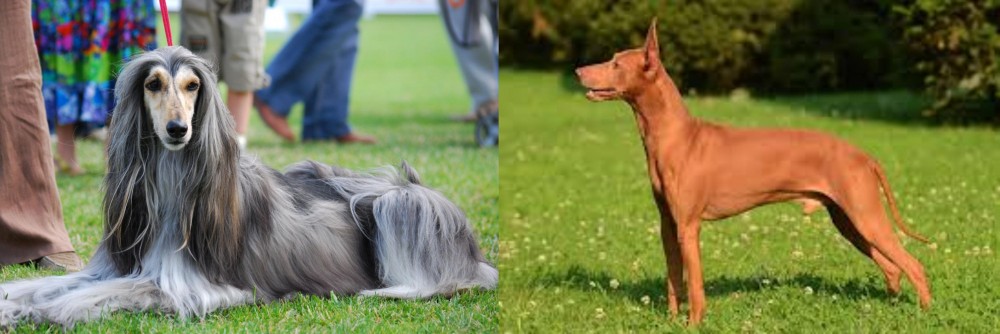 Afghan Hound is originated from Afghanistan but Cirneco dell'Etna is originated from Italy. Afghan Hound may grow 22 cm / 9 inches higher than Cirneco dell'Etna. Afghan Hound may weigh 22 kg / 49 pounds more than Cirneco dell'Etna. Both Afghan Hound and Cirneco dell'Etna has almost same life span. Afghan Hound may have less litter size than Cirneco dell'Etna. Afghan Hound requires High Maintenance. But Cirneco dell'Etna requires Moderate Maintenance
Afghan Hound is originated from Afghanistan but Cirneco dell'Etna is originated from Italy. Afghan Hound may grow 22 cm / 9 inches higher than Cirneco dell'Etna. Afghan Hound may weigh 22 kg / 49 pounds more than Cirneco dell'Etna. Both Afghan Hound and Cirneco dell'Etna has almost same life span. Afghan Hound may have less litter size than Cirneco dell'Etna. Afghan Hound requires High Maintenance. But Cirneco dell'Etna requires Moderate Maintenance
 The first known information about Afghan Hound was in the 19th century. That dog looked like a Saluki. The breed that we know today is a mix of an Afghan hound accentor which came to Britain in 1920s and other breeds that were popular in that period. Afghan Hound became popular because they were used to hunt big prays in Afghanistan. One of those breeds was Tasy breed. They were very popular among royalty because of its posture and elegance. Their popularity grew very quickly through the whole Europe.
The first known information about Afghan Hound was in the 19th century. That dog looked like a Saluki. The breed that we know today is a mix of an Afghan hound accentor which came to Britain in 1920s and other breeds that were popular in that period. Afghan Hound became popular because they were used to hunt big prays in Afghanistan. One of those breeds was Tasy breed. They were very popular among royalty because of its posture and elegance. Their popularity grew very quickly through the whole Europe.
They were also very popular because they were used to hunt antelopes, gazelles, and snow panthers. In India, English soldiers used them as a mail carrier.
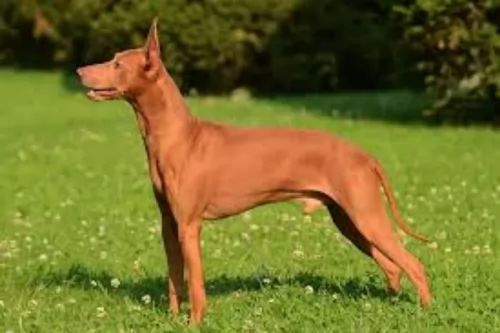 The Cirneco dell’Etna comes from the island of Sicily and not mainland Italy, although it is considered an Italian dog. It is a small dog that hunted rabbits and its calling card was its ability to go for hours without water or food. They have terrific endurance and a good sense of smell. They were developed for the harsh terrain they worked around places like Mount Etna. Of all the Mediterranean island hunting dogs, the Cirneco de’Etna is the smallest.
The Cirneco dell’Etna comes from the island of Sicily and not mainland Italy, although it is considered an Italian dog. It is a small dog that hunted rabbits and its calling card was its ability to go for hours without water or food. They have terrific endurance and a good sense of smell. They were developed for the harsh terrain they worked around places like Mount Etna. Of all the Mediterranean island hunting dogs, the Cirneco de’Etna is the smallest.
This is a very ancient breed, surviving on its hunting skills alone for thousands of years on Sicily. They then became guard dogs for the peasants. Because they had such speed, sense of smell, alertness and sight, they were great hunters.
Today’s Cirneco de’Etna is highly competitive in confirmation and make terrific pets. They are exceedingly friendly, energetic and low maintenance. Lure coursing is what they really excel at. They are good at agility and pursuit games as well.
 The average weight of an adult male is 26-34kg, while females are smaller with an average weight approximately 23 kg.
The average weight of an adult male is 26-34kg, while females are smaller with an average weight approximately 23 kg.
While average height of the Afghan Hound is 68-74cm. Females are slightly smaller with an average height of 63cm.
The lifespan of an Afghan Hound is 12-14 years, but that always depends on the dog to dog. If you have a healthy dog and you take proper care, they tend to live much longer than average lifespan.
Litter Size again variates from dog to dog, but an average litter size is 6-7 puppies.
Afghan hound has many other names, so you might know this breed as Tazi, Tazhi Spay, Da Kochyano Spay, Sage Balochi, Ogar Afgan, Barakzai Hound, Eastern Greyhound, and Persian Greyhound.
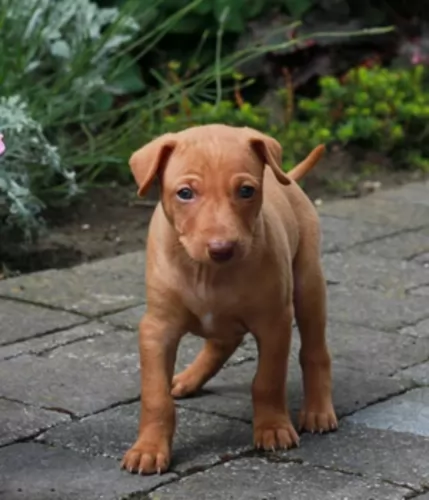 The Cirneco de’Etna is a sleek, muscular sighthound. His ears are close together and high on his head. The head is lean, and the skull is almost flat in profile. The muzzle is about the same length as the skull and the nose is large and its coloring matches the dog’s coat. They have hard pads the same color as their nails, but they are never black.
The Cirneco de’Etna is a sleek, muscular sighthound. His ears are close together and high on his head. The head is lean, and the skull is almost flat in profile. The muzzle is about the same length as the skull and the nose is large and its coloring matches the dog’s coat. They have hard pads the same color as their nails, but they are never black.
 Afghan hounds love spending time with one owner or one family. They are not very sociable with other guests. They won’t bark or attack. They simply just don’t enjoy big crowd company. They do not enjoy spending time with children, but if trained properly they will learn to adjust. They simply don’t like quick and sudden movements, but they are not aggressive towards children. They are very independent and intelligent dogs. It is important to be gentle, patient and kind because they love positive training and awards. They are amazing breed with proper owner. Rough handling and punishments will make Afghan hound withdrawn or even depressed. Afghan hound do not tend to please its owner.
Afghan hounds love spending time with one owner or one family. They are not very sociable with other guests. They won’t bark or attack. They simply just don’t enjoy big crowd company. They do not enjoy spending time with children, but if trained properly they will learn to adjust. They simply don’t like quick and sudden movements, but they are not aggressive towards children. They are very independent and intelligent dogs. It is important to be gentle, patient and kind because they love positive training and awards. They are amazing breed with proper owner. Rough handling and punishments will make Afghan hound withdrawn or even depressed. Afghan hound do not tend to please its owner.
 Afghan hounds are generally very healthy breed. But, as every breed, they have tendencies to some health problems. If you want to prevent those diseases it is important to select a right and healthy puppy.
Afghan hounds are generally very healthy breed. But, as every breed, they have tendencies to some health problems. If you want to prevent those diseases it is important to select a right and healthy puppy.
Elbow and hip dysplasia are basically common health problem to any big breed. Juvenile cataracts, Cancer and Hypothyroidism are some of the health problems that have been found in this breed, but overall, with proper care and regular vet checks, you will have a happy and healthy Afghan.
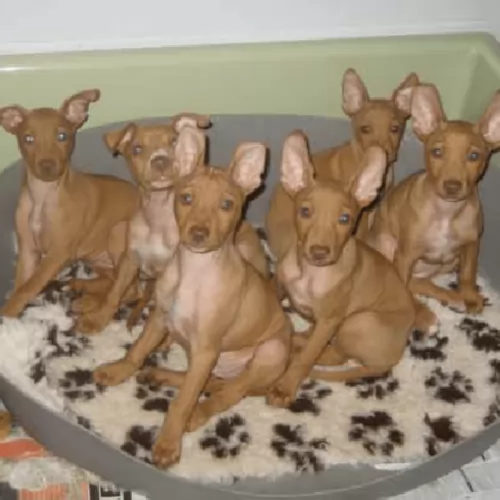 Like many dogs that come from ancient breeds with little cross breeding over the years, there are not a lot of inherited issues for the Cirneco de’Etna. Also, there are so few dogs remaining that little is known about their health in general and there are no studies to go on. Some breeders will do test despite the fact that none are recommended.
Like many dogs that come from ancient breeds with little cross breeding over the years, there are not a lot of inherited issues for the Cirneco de’Etna. Also, there are so few dogs remaining that little is known about their health in general and there are no studies to go on. Some breeders will do test despite the fact that none are recommended.
Their most common health issues are acquired such as injuries from running or competitions and obesity. Both can be controlled by the owner.
 Afghan hound loves eating and 2-2.5 cups of high-quality dry food. It is better if the dog is feeding twice a day. Always depends on the activity of the dog, metabolism, age, size and built. So it is important to observe your dog and to realize what is the best quantity of food.
Afghan hound loves eating and 2-2.5 cups of high-quality dry food. It is better if the dog is feeding twice a day. Always depends on the activity of the dog, metabolism, age, size and built. So it is important to observe your dog and to realize what is the best quantity of food.
Feeding the Afghan puppy should be feed at least 3-5 times per day. It is important to feed your puppy with smaller portions, but more times per day.
Grooming this breed is not very hard, but it requires grooming and taking care of the long coat. Besides a couple of baths, every year and regular everyday grooming will make your dog hair look amazing! Afghan hound is not dog with a lot of requirements.
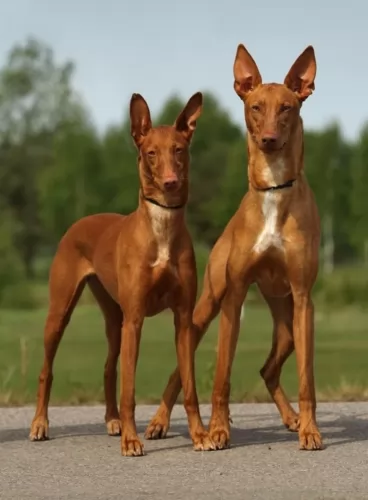 The Cirneco needs a good quality food since they are such high energy dogs. Be careful not to overfeed them so that they become obese.
The Cirneco needs a good quality food since they are such high energy dogs. Be careful not to overfeed them so that they become obese.
As previously mentioned, the main concern for owners is injuries acquired while on a running course or in the activities of daily living. They have been known to hurt their feet. They need their ears checked regularly for any signs of infection or irritation. Clean out any excess water or dirt.
This is an intelligent, hardy breed that needs mental and physical stimulation. They need a job, or they can be a major problem. They love hunting of course but also excel at agility, lure crossing, and competition. He is loyal and loves being with people. Take him for long walks but don’t let him off the leash.